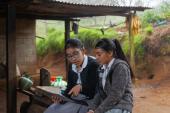Blog post
Open government and educational quality for SDG 4: a look at Spain and Mexico

Open Government and its relationship with education
Education plays a crucial role in shaping informed and participatory individuals in society. In an increasingly connected and digitized world, where there is talk of an Information Society, it is imperative that governments adopt measures that promote open and accessible education for all.
Open government can contribute to improving the quality of education by providing citizens with access to relevant information on education policy, education budgets, and education outcomes. It also facilitates the active participation of students, teachers, and parents in education-related decision-making.
In this sense, it is necessary to explore the possibilities offered by open government to foster greater transparency in educational institutions, promote effective citizen participation and involve all relevant actors in the design and implementation of educational policies.
From Open Government to SDG4
Open Government and quality education, as expressed by the fourth Sustainable Development Goal (SDG 4)are two key issues on the agenda of Spain and Mexico. Both countries have recognized the importance of promoting an inclusive, equitable and quality education system as a basis for sustainable development. Although the qualification of "quality" can be interpreted in different ways, it is a concept that has been transferred from the organizational to the educational sphere and for UNESCO: Culture is an important factor that can accelerate development and ensure its sustainability.
In terms of SDG 4, the aim is to ensure inclusive, equitable and quality education for all. This implies not only providing access to universal basic education, but also improving the skills acquired by students, as well as promoting values such as gender equality, respect for human rights, and environmental sustainability.
In Spain, several open government initiatives have been implemented in the education sector. For example, citizen participation in curriculum design processes has been promoted and digital platforms have been created to facilitate access to information on schools and academic results.
Mexico has also taken steps to promote open government in education. A national evaluation system has been established to improve the quality of the education system and several programmes have been implemented.
In summary, both Spain and Mexico are actively working to strengthen open government and improve the quality of education. These initiatives are fundamental to ensure quality, inclusive, and equitable education, thus contributing to the achievement of SDG 4 to ensure inclusive, equitable and quality education for all. Through open government and concrete measures to improve the quality of education, Spain and Mexico seek to ensure that no child or young person is excluded from the fundamental right to receive an adequate education.
From Action Plans to implementation
The results of the peer-reviewed research on this work show that, although Mexico had a mismatch between education spending, low student performance, and Mexican parents' satisfaction with their children's education, the main causes were lack of parental information and corruption. To address both issues, the Mexican Institute for Competitiveness (IMCO) with the support of the Omidyar Network launched the online platform Mejora tu Escuela. The results: parents felt more empowered to communicate with teachers when they had more information.
As Spain showed a decline in trust in its public institutions and a lack of interest in public affairs by its citizens, their Action Plan focused on educating children and young people to be responsible citizens using Educational Guides on open government for Primary, Secondary and Baccalaureate Education for students to understand its importance and how they can demand transparency and participate in public affairs. For teacher training, they used MOOCs, developed guidance material, student training, and project evaluations.
There is no doubt that Mexico and Spain, through their Action Plans submitted to the open government Partnership, have reaped rewards by using open data and allowing citizens to get involved. Collaboration between governments and civil society is essential to ensure the mobilization of stakeholders and the implementation of participatory tools, such as social audits, to carry out comprehensive open government education projects.
Maria Fatima Pinho-De Oliveira is Professor at the Department of Economics and Administrative Sciences and Coordinator of Social and Administrative Sciences of the Deanate of Research and Development at the Universidad Simón BolívarVenezuela, responsible for projects on Open Government.







29.07.2023